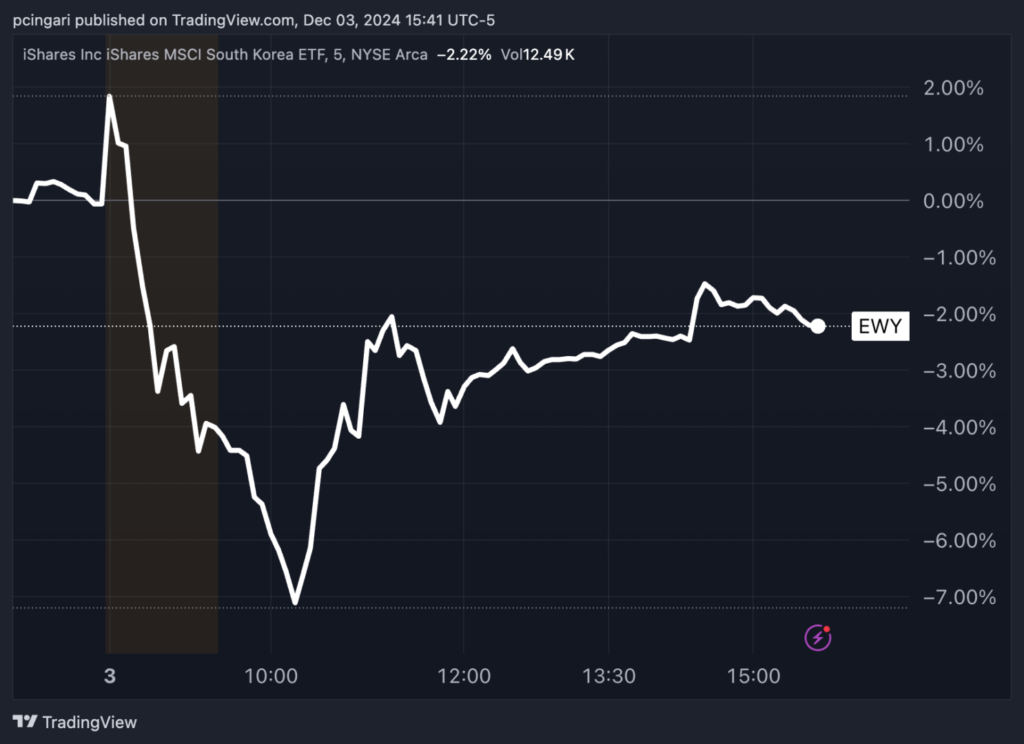South Korean markets staged a sharp recovery Tuesday afternoon after President Yoon Suk Yeol reversed a martial law declaration just hours after its announcement following a unanimous parliamentary vote against the measure.
The iShares MSCI South Korea ETF (NYSE:EWY), a key vehicle for U.S.-based investors seeking exposure to South Korean equities, pared early losses of over 6% to trade down 1.6% as of 3 p.m. ET.
Similarly, the Franklin FTSE South Korea ETF (NYSE:FLKR) was down 1%, recovering from steeper declines earlier in the session.
The South Korean won weakened by 0.9%, recovering somewhat from a 2% plunge against the U.S. dollar earlier in the day.
Volatile Tuesday For South Korean Assets
The day began with a political crisis that rattled global observers and sent South Korean markets into freefall.
Late Tuesday night in Seoul, Yoon declared martial law during a televised address, claiming it was necessary to counter what he described as “anti-state forces” within the opposition.
Yoon accused opposition lawmakers of orchestrating gridlock in parliament, undermining key institutions and weaponizing fiscal policy by proposing a 4 trillion won ($2.8 billion) budget cut to cripple his administration.
Financial markets reacted abruptly, with U.S.-listed Korea-linked ETFs facing their steepest early losses since March 2020 during morning trading.
The South Korean won tumbled nearly 3%, on track for its worst single-day decline since Nov. 9, 2016, when Donald Trump‘s victory in the U.S. presidential election triggered a global selloff in emerging markets.
Chart: South Korean ETFs Rebound Sharply After Parliament Overturns Martial Law

The president's sudden declaration triggered chaos. Members of Yoon’s own party urged him to lift the decree, with lawmakers condemning it as "unconstitutional."
Soldiers stormed the National Assembly building, smashing windows to gain entry and blocking lawmakers from entering.
The crisis drew international attention. U.S. Ambassador to South Korea Philip Goldberg commented on X, stating: "The U.S. Embassy and Department of State are closely tracking President Yoon’s recent declaration of martial law. The situation is fluid."
In response to the crisis, the Bank of Korea announced plans to hold an emergency meeting Wednesday to assess the potential economic and currency fallout.
The Bank of Korea governor, the minister of finance and other financial authorities vowed to provide an unlimited amount of liquidity to stabilize markets.
As reported by Reuters in New York afternoon hours, Yoon's surprise martial law declaration was swiftly and unanimously overturned by 190 National Assembly members, who defied police and military blockades to cast their votes.
According to South Korean law, the president is required to immediately lift martial law if parliament rejects it with a majority vote.
In a brief statement following the vote, Yoon announced that a cabinet meeting would be convened as soon as possible to address the unfolding situation.
Most of the protesters who had gathered outside the National Assembly returned home after the announcement that martial law would be lifted.
The cabinet meeting convened by Yoon officially confirmed the lifting of the martial law.
Read Next:
Photo via Shutterstock.







